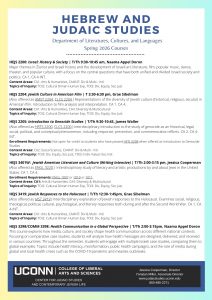Spring 2026 HEJS Courses














UConn's Hebrew and Judaic Studies program is intended to introduce students to the culture and civilization of the Jewish people. Courses cover various aspects of the history and literature of the Jews from biblical times to the present. Students who would like to learn more about ancient and modern Israel, the experience of Jews among Christians or Muslims, or Jewish life in contemporary America will find many courses of interest among our offerings.
Judaic studies offers students many opportunities for cross-disciplinary study. Most Judaic studies courses are offered in the Hebrew and Judaic Studies (HEJS) section of the Department of Literatures, Cultures & Languages (LCL). Many are cross-listed or offered with other departments, such as History or English, and students may choose to register under those rubrics if they prefer.
Students may minor or major in Judaic studies, with the option of an Honors Scholar plan. The Master of Arts and Doctorate of Arts in Judaic studies is also available.
Many Judaic studies courses meet Content Area requirements. Some qualify as Honors and/or W courses.
Spring 2026 Course Offerings in Judaic Studies
HEJS 2200: Israel: History & Society | T/Th 9:30-10:45 am, Naama Appel Doron
Major themes in Zionist and Israeli history and the development of Israeli art, literature, film, popular music, dance,
theater, and popular culture, with a focus on the central questions that have both unified and divided Israeli society and
politics. CA 1. CA 4-INT.
Content Areas: CA1: Arts & Humanities, CA4INT: Div & Multi - Intl
Topics of Inquiry: TOI2: Cultural Dimen Human Exp, TOI3: Div, Equity, Soc Just
HEJS 2204: Jewish Culture in American Film | T 3:30-6:30 pm, Grae Sibelman
(Also offered as AMST 2204, CLCS 2204.) Representations of the diversity of Jewish culture (historical, religious, secular) in
American film. Introduction to film analysis and interpretation. CA 1. CA 4.
Content Areas: CA1: Arts & Humanities, CA4: Diversity & Multicultural
Topics of Inquiry: TOI2: Cultural Dimen Human Exp, TOI3: Div, Equity, Soc Just
HEJS 2205: Introduction to Genocide Studies | T/Th 9:30-10:45, James Waller
(Also offered as HRTS 2200, CLCS 2200.) Interdisciplinary introduction to the study of genocide as an historical, legal,
social, political, and conceptual phenomenon, including response, prevention, and commemoration efforts. CA 2. CA 4-
INT.
Enrollment Requirements: Not open for credit to students who have passed HEJS 3298 when offered as Introduction to Genocide Studies.
Content Areas: CA2: Social Science, CA4INT: Div & Multi - Intl
Topics of Inquiry: TOI3: Div, Equity, Soc Just, TOI5: Indiv Values Soc Inst
HEJS 3401W: Jewish American Literature and Culture (Writing Intensive) | T/Th 2:00-3:15 pm, Jessica Cooperman
(Also offered as ENGL 3220.) Interdisciplinary study of literary and artistic productions by and about Jews in the United States. CA 1. CA 4.
Enrollment Requirements: ENGL 1007 or 1010 or 1011.
Content Areas: CA1: Arts & Humanities, CA4: Diversity & Multicultural
Topics of Inquiry: TOI2: Cultural Dimen Human Exp, TOI3: Div, Equity, Soc Just
HEJS 3419: Jewish Responses to the Holocaust | T/Th 12:30-1:45pm, Grae Sibelman
(Also offered as HIST 3419.) Interdisciplinary exploration of Jewish responses to the Holocaust. Examines social, religious, theological, political, cultural, psychological, and literary responses both during and after the Second World War. CA 1. CA 4-INT.
Content Areas: CA1: Arts & Humanities, CA4INT: Div & Multi - Intl
Topics of Inquiry: TOI2: Cultural Dimen Human Exp, TOI3: Div, Equity, Soc Just
HEJS 3298/COMM 3398: Health Communication in a Global Perspective | T/Th 2:00-3:15pm, Naama Appel Doron
This course explores how media, culture, and society shape health communication across different national contexts.
Focusing on comparative case studies, students will analyze how health messages are designed, delivered, and received
in various countries. Throughout the semester, students will engage with multiple Israeli case studies, comparing them to global examples. Topics include health literacy, misinformation, public health campaigns, and the role of media during global and local health crises such as the COVID-19 pandemic and measles outbreaks.
